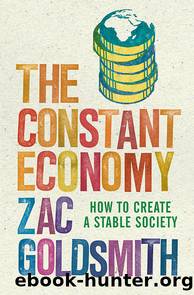The Constant Economy by Zac Goldsmith

Author:Zac Goldsmith
Language: eng
Format: epub
Publisher: Atlantic Books
Published: 2014-02-14T00:00:00+00:00
Protected areas
By far the most effective measure would be to divide the sovereign waters into a vast network of marine protected areas. There would be varying levels â with the most highly protected areas being entirely off-limits to human activity; the second level allowing recreational fishing and tourist activities which do not damage the environment; the third level allowing fishing with vessels of a limited size; and the fourth level allowing some extraction. Marine protected areas are by far the quickest and best way to recover fish stocks. Where they have been introduced, they have worked and have been embraced by local fishing communities.
In Kyoto, Japan, for instance, the proportion of large male snow crabs rose by 32 per cent after just four years of protection. In New Zealand's Leigh Marine Reserve, the most common predatory fish are six times more abundant in the reserve than outside, and in the Tawharanui Marine Reserve, there are 60 per cent more species in the reserve than outside. And while Spain has suffered particularly badly from overfishing, catches close to the Tabarca Marine Reserve were 50 to 85 per cent higher after six years of protection than elsewhere. In the Galician fishing village of Lira, Spanish fishermen are now campaigning for a local reserve of their own â the first time this has ever happened.
The evidence is hugely compelling, yet only a tiny proportion of the UK's seas â no more than 2 per cent â are protected against destructive overfishing. This is nothing like enough space for fish stocks to recover and breed, safe from the nets, lines and trawlers. According to Professor Callum Roberts, author of The Unnatural History of the Sea, and professor of marine conservation at York University, a minimum of 30 per cent of the sea needs to be completely off-limits to fishing if we're to reverse the decline. Only an area this size, he argues, will allow migratory fish species like the common skate to recover.
There are signs that world leaders are beginning to listen. In early 2009, President Bush announced the creation of the world's biggest marine reserve â an area of the Pacific equal in size to Spain. It was a final grand gesture, perhaps designed to counter his image as America's least environmental president. Either way, it's good news.
If we work with real people, the fishing communities and the sea anglers, the mythical problem of the terrifying 'fishing lobby' would disappear. These people need fish stocks to be healthy, and would directly benefit from conservation. Stocks would improve, and without competition from the monster trawlers, they would thrive.
If sustainability means drawing on the world's interest, not its capital, then the world of fishing is perhaps the clearest example. If the Canadian government had maintained balance in its handling of the great Newfoundland fishery, the country could have reliably drawn about 250,000 tonnes of cod each year, for eternity. But because it plundered the 'capital', stocks were ravaged and the capital itself has shrunk to just 1 per cent of what was once an annual yield.
Download
This site does not store any files on its server. We only index and link to content provided by other sites. Please contact the content providers to delete copyright contents if any and email us, we'll remove relevant links or contents immediately.
Zero to IPO: Over $1 Trillion of Actionable Advice from the World's Most Successful Entrepreneurs by Frederic Kerrest(4568)
Machine Learning at Scale with H2O by Gregory Keys | David Whiting(4313)
Never by Ken Follett(3955)
Harry Potter and the Goblet Of Fire by J.K. Rowling(3856)
Ogilvy on Advertising by David Ogilvy(3622)
Shadow of Night by Deborah Harkness(3367)
The Man Who Died Twice by Richard Osman(3077)
Book of Life by Deborah Harkness(2938)
The Tipping Point by Malcolm Gladwell(2921)
Will by Will Smith(2919)
Purple Hibiscus by Chimamanda Ngozi Adichie(2853)
0041152001443424520 .pdf by Unknown(2845)
My Brilliant Friend by Elena Ferrante(2831)
How Proust Can Change Your Life by Alain De Botton(2814)
How to Pay Zero Taxes, 2018 by Jeff A. Schnepper(2655)
Hooked: A Dark, Contemporary Romance (Never After Series) by Emily McIntire(2553)
Rationality by Steven Pinker(2363)
Can't Hurt Me: Master Your Mind and Defy the Odds - Clean Edition by David Goggins(2341)
Borders by unknow(2313)
